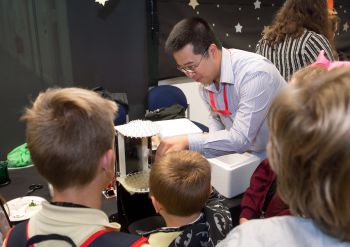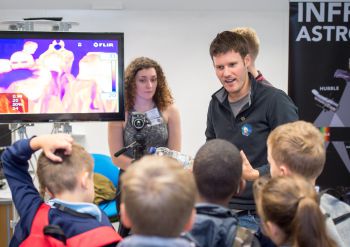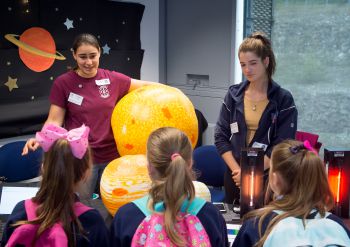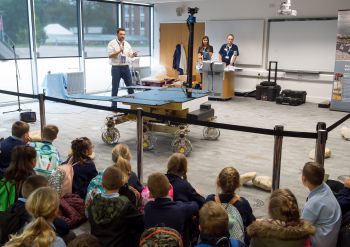Sussex teams inspire local school children with astronomical day
By: Jacqui Bealing
Last updated: Friday, 14 September 2018

Research Fellow Chi Vi demonstrates how to make food float with soundwaves

Scientists working on the James Webb telescope demonstrate the effects of infrared

Astrophysicists use inflatable planets to describe the Universe

John Chinner with Bruno, the ExoMars Rover
At a speed of two centimetres per second, Bruno, the ground demonstration model of the ExoMars Rover, was making slow progress around the floor of Jubilee Building at the University of Sussex.
For the 750 schoolchildren who had come to see the prototype robot, it was still awesome.
Their hands shot up when offered the opportunity to ask questions. Does it have batteries? What’s it for? Can you sit on it?
John Chinner, propulsion engineer at Airbus UK, who are developing the rover to be sent to the red planet in 2020, was ready with the answers (“…yes, powered by solar panels”, “…to look for signs of life, “…probably best not to”).
John and the children were taking part in PrimarySpace Day (12 September 2018), the first event of its kind on a university campus. Its aim was to encourage primary school children to consider careers in science, technology, engineering and maths (STEM).
PrimarySpace is a charity founded by Katherine Courtney, former CEO of the UK Space Agency and a Brighton resident, who wants to inspire young people to work in the science, space and tech industries.
“Only 12 people have walked on the moon,” she told her young audience as the day began in the Jubilee Lecture Theatre. “But there are currently more than 40,000 people working in the space industry in the UK. And by the time you are ready to join the workforce, this number will have doubled.”
In an extraordinary feat of organisation, Year 2 and Year 5 children from schools around Brighton, including St Luke’s and St Mark’s, as well as further afield in Sussex, not only got to watch Bruno make its moves, they also had the opportunity to explore many of the innovative and extraordinary projects being carried out by Sussex scientists and students.
Among those taking part were researchers from the Sussex Computer Human Interaction laboratory (SCHI), who were encouraging the young visitors to float tiny particles of bread or cheese with soundwaves, and to see if a calming blast of lavender would slow down their driving in a car simulator.
Meanwhile, astrophysicists involved with the James Webb telescope were using inflatable planets and infrared cameras to explain how they are searching for new galaxies.
And researchers from the School of Life Sciences had set up an array of microcopes for the children to observe tardigrades – strange micro creatures that can live in extreme conditions, from volcanoes to space “…and they don’t even need spacesuits”.
In addition to Airbus, two other companies talked to the children about the work they are currently doing at the forefront of space technology.
Avanti Communications described how satellites are used to help schools in remote parts of Africa to connect to the Internet, while engineers from UK company Reaction Engines encouraged the children to make a Lego model of a hypersonic engine that will combine the technology of rocket engines and jet engines to create reusable space vehicles.
Teachers from the School of Education and Social Work were also involved in running outreach sessions with the children before and after the event to find out what they had learned, what they found interesting, and what they would take away with them.
A feedback board revealed comments such as: “Men and women can do jobs in space,” while a list of possible future occupations thought up by the children included “space footballer” and “selling spacesuits”.
Sam Dunnett, Deputy Head of Widening Participation at Sussex who project managed the event, was delighted with the enthusiasm and energy shown by all those involved.
“This is the biggest, most complex event that we have ever done,” she said. “It’s been amazing to see it all come together and is a testament to the professionalism of our team.
“Most of these children have probably not been on a university campus before, so for them to see what goes on here, and to meet the scientists, is a really special experience. This could be the moment when some of them decide what they want to do with their lives.”
Following the success of the PrimarySpace Day at Sussex, Katherine Courtney hopes to set up a nationwide programme of similar events.
“The majority of girls and boys at this age say they find maths and science interesting. By the time they reach adolescence, that interest has dropped, and it drops further when they do GCSEs, A levels and degrees.
“But if you can give children an unforgettable experience on a university campus, and get them seeing real people doing real jobs, then that’s very inspirational. That may well stick in their memory bank.”
